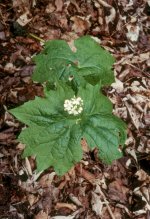 Diphylleia cymosa
Diphylleia cymosa
Unlike its very close cousin, Podophyllum peltatum ("May Apple"), Diphylleia cymosa ("Umbrella Leaf") doesn't hide its flowers from you. Quite to the contrary, they're right up in your face. Well, right in your face if you're 24" tall. Otherwise, let's just say that they're well presented at the top of the plant. The flowers last for a week or two and then give way to a cluster or cyme of purplish - black berries that enlarge and ripen during the Summer months.
I grow Diphylleia cymosa in light shade in a moist swag with the companionship of Veratrum viride. It doesn't require as much moisture as the Veratrum, but it appears to be very much at home and to have a wider window of acceptable growing conditions than most plants.
This plant was discovered and named by Andre Michaux 1747-1802. Andre Michaux was a French botanist who spent an extraordinary amount of time exploring the flora and fauna of the Appalachian Mountains. He was a friend of Thomas Jefferson and you can read a letter that Jefferson wrote to Michaux at: http://www.monticello.org/jefferson/lewisandclark/michaux.html You can learn more about this famous plant explorer at:http://www.hcs.ohio-state.edu/hort/history/111.html There's even an Andre Michaux website at: http://www.michaux.org/ The Genus name refers to the fact that there are 2 (di) leaves (phylla) and the specific epithet describes the shape of the inflorescence, a cyme. There's a chart that describes and illustrates several forms of inflorescences at: http://www.discoverlife.org/nh/tx/Plantae/Dicotyledoneae/Berberidaceae/Diphylleia/cymosa/images/inflor.jpg
A great closeup image of the flowers can be found at http://2bnthewild.com/plants/H123.htm
This genus has at least one other species, Diphylleia sinensis, which grows in East Asia and Japan and seems to be synonymous with Diphylleia grayi. Now, here's a link to an article that I found fascinating but, quite a bit to digest. I've always wondered about Asian counterpart species to our American natives and which one came first etc, or a concept better known as "Divergence of Species". This article may not do much more than overwhelm you, but it's extremely interesting: http://www4.ncsu.edu:8030/~qyxiang/Papers/XiangSoltis2000.pdf
Seeds collected in late Summer and macerated in a colander under running water germinate easily, and rhizomes of mature plants will yield several divisions that reestablish themselves very quickly.
Taxonomic Hierarchy
Kingdom - Plantae - Plants
Subkingdom - Tracheobionta - Vascular plants
Superdivision - Spermatophyta - Seed plants
Division - Magnoliophyta - Flowering plants
Class - Magnoliopsida -dicotyledons
Subclass - Magnoliidae
Order - Ranunculales
Family - Berberidaceae
Genus - Diphylleia
Species - Cymosa
Common name - genus - "Umbrella Leaf"
Common name - species - "Umbrella Leaf"
Synonyms - None that I have found
Native range - Mountainous regions of the south eastern United States.
USDA Hardiness Zone - 5, maybe 4
Light preference - Shade
Soil fertility preference - Rich
Soil moisture preference - Moist to average
Bloom time - Early Spring
Bloom color - White
Foliage - Dark green, deeply veined and scalloped
Spread - 18" - 36"
Height - 18" - 36"
Landscape uses - Wild shade garden or shady border
Medicinal uses - A root tea was supposedly used by the Cherokees to induce sweating, this plant's range closely matches the original territory of the Cherokees.
|


 Diphylleia cymosa
Diphylleia cymosa